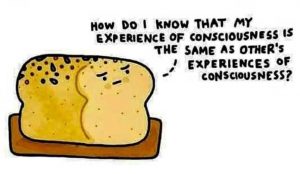 Quoting from the talk of an Advaita teacher on the message of the aitareya Upanishad:
Quoting from the talk of an Advaita teacher on the message of the aitareya Upanishad:
“It is Consciousness that impels us to feel hungry. It is Consciousness that impels the food to let itself be eaten. Consciousness propels us to perceive the world and It commands the world to be seen by us. Our seeing becomes meaningless if there is no world to be seen. The appearance of the world is meaningless if there is none as the seer. Both are impelled in their actions by the One Consciousness.
Consciousness, wearing us as a costume, impels us to perceive. The same Consciousness, wearing the world as a costume, impels it to be known.The One Knowingness (Consciousness) appears as the knower and also as the known.
Goodness Gracious! What a drama does Consciousness play!”
It is a great rejoicing for a Vedantin who really groks that play of the Consciousness and fully ingests the Oneness of the Seer and the seen (subject-object), . Shankara likes to describe it as “reveling in love.” Commenting on the mantra 7.25.2 of chAndogya, he writes:
एकमजं सर्वतो व्योमवत्पूर्णम् अन्यशून्यं पश्यन् स वा एष विद्वान् मननविज्ञानाभ्याम् आत्मरतिः आत्मन्येव रतिः रमणं यस्य सोऽयमात्मरतिः । तथा आत्मक्रीडः ।
देहमात्रसाधनाः रतिः बाह्यसाधना क्रीडा, लोके स्त्रीभिः सखिभिश्च क्रीडतीति दर्शनात् । न तथा विदुषः ; किं तर्हि, आत्मविज्ञाननिमित्तमेवोभयं भवतीत्यर्थः ।
मिथुनं द्वन्द्वजनितं सुखं तदपि द्वन्द्वनिरपेक्षं यस्य विदुषः ।
तथा आत्मानन्दः, शब्दादिनिमित्तः आनन्दः अविदुषाम् , न तथा अस्य विदुषः ;
किं तर्हि, आत्मनिमित्तमेव सर्वं सर्वदा सर्वप्रकारेण च ; देहजीवितभोगादिनिमित्तबाह्यवस्तुनिरपेक्ष इत्यर्थः । स एवंलक्षणः विद्वान् जीवन्नेव स्वाराज्येऽभिषिक्तः पतितेऽपि देहे स्वराडेव भवति ।
Meaning: “It is Self Itself that is all everywhere. The wise man who sees this One, unborn, all-pervading, like AkAsha, full, without a second, and having seen It, reflects upon It and understands lt, he comes to love Self ; i. e. has all his love, affection, joy, centered in the Self, so also he revels with the Self;
‘Love’ (rati’) stands for what is carried on with the body alone, while ‘Real ‘ krIDa, stands for what is carried on through external means entirely; as is clear from the use of the root ‘krIDa‘ to revel, which is used in the world in connection with one’s wives and friends. It is not so for the wise man; for him both these (‘love’ and ‘reveling’) are brought about by his knowledge of the Self.
The enjoyment of company is pleasure due to the companionship of two persons, this also for the wise, is independent of duality (the second person). Similarly, he rejoices in the Self;
For the ignorant, the rejoicing is due to sound and other objects. Not so for the wise, for whom, all rejoicing, at all times and in all ways is due to the Self alone.
It is not due to such agencies as the body, the physical-life and experiences, and is entirely independent of all external things. The knowing man who is as described becomes the Self-Sovereign even while he is still alive, and also when his body dies, he becomes the Self-Sovereign.” — Translation: Dr. Ganganatha Jha, 1942.
Perhaps that stands as a redoubtable test for Self-realization.
[Note: The Pic at the top left is adopted from an Internet Post.]
